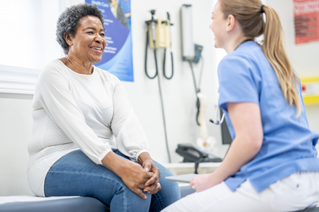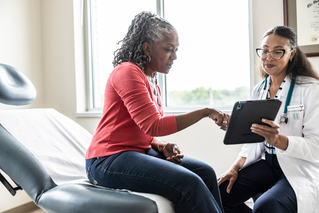Essential Screenings
Essential screenings can help find cancers and other diseases early, when they are easier to treat. Many diseases have no symptoms at first, but screenings can catch them in time. Getting routine screenings could save your life.
Cervical Cancer Screening
Cervical cancer screening helps detect abnormal changes in the cervix before they become cancerous. The two main screening tests are:
- Pap Smear (Pap Test): Detects abnormal cervical cells
- HPV Test: Identifies high-risk human papillomavirus (HPV) types that can lead to cervical cancer
- Ages 21-29: Pap smear every 3 years
- Ages 30-65: Every 3 years (or every 5 years with HPV testing)
- 65 and older: Screening may stop if past results were normal
Early detection allows for timely treatment, reducing the risk of cervical cancer. Cervical cancer is largely preventable with the right measures: HPV vaccination, regular screening, safe sexual practices and no smoking.
Human papillomavirus (HPV) is a common virus spread through sexual contact. Most HPV infections go away on their own, but some high-risk types can cause abnormal cell changes that may lead to cervical cancer. The HPV test can help detect these high-risk strains early, allowing timely monitoring and treatment. The virus can infect both men and women and usually doesn’t cause any signs or symptoms. Most people don’t know they have it, which makes it easy to spread. That’s why routine screenings are so important.
A healthcare provider collects a sample of cervical cells during a pelvic exam. The procedure is quick and usually painless.
- Normal results: Continue regular screenings
- Abnormal results: Follow-up testing may be needed
Regular screening is key to prevention. Talk to your healthcare provider about the best schedule for you.

Sexually Transmitted Infections (STI's)
What You Should Know: Sexually transmitted infections (STIs), also called sexually transmitted diseases (STDs), are infections that spread from one person to another. They spread during vaginal, anal, or oral sex. Common STIs include chlamydia, gonorrhea, syphilis, HIV, herpes, HPV, and trichomoniasis (also called “trich”). Many people with STIs do not feel sick or have any symptoms. But if they are not treated, STIs can cause serious health problems.
Testing is the only way to know for sure if you have an STI. It is fast and simple. Some STIs can be cured and go away completely. Others cannot be cured, but they can be treated with medicine to help you feel better and protect your partner. You can get tested at: a doctor’s office, a health clinic, community health centers, or mobile or pop-up testing sites. Testing may include: a urine test, a blood test, a swab from your mouth, throat, genitals, or rectum or a quick check-up with a provider.
For Everyone:
- Ages 13–64: Get tested at least once for HIV.
- Anyone with new or multiple sex partners, or a partner with an STI, should be tested regularly.
For Women:
- Under 25 and sexually active: Test every year for chlamydia and gonorrhea.
- 25 or older with risk factors (new/multiple partners): Test yearly for chlamydia and gonorrhea.
- Pregnant: Get tested early for HIV, syphilis, hepatitis B, and hepatitis C.
For Men:
- Men who have sex with men (MSM): Test at least once a year for HIV, syphilis, chlamydia, and gonorrhea—more often if you have multiple partners.
- Anyone who has had oral or anal sex: Ask your doctor about throat and rectal testing.
- Men with symptoms like discharge, burning while peeing, or sores: Get tested right away.
For People Who Use Injection Drugs:
- Test at least once a year for:
- HIV
- Syphilis, chlamydia, and gonorrhea (especially if sexually active or engaging in survival sex)
- Hepatitis B & C
- Injection drug use increases STI risk through both needle sharing and sexual exposure.
- Ask your provider about hepatitis A and B vaccines if you haven't been vaccinated.
Find a Testing Location– Be sure to confirm that the location you choose is in-network with Home State Health
First, do not panic. Many STIs are easy to treat—some with just one dose of medicine. Even for STIs that do not have a cure, like herpes or HIV, there are medications to help manage them and keep you healthy.
If you test positive:
- Follow your treatment plan. Take all your medicine, even if you feel fine.
- Tell your partner(s). They may need to get tested and treated too.
How to Talk to a Partner About STIs - Avoid sex until your treatment is done, and your doctor says it is okay.
- Ask questions. Your doctor or nurse can help you understand what’s next.
Tips for Talking to Your Doctor
Some people feel scared or embarrassed, but you are not alone. STIs are very common, and getting tested is a brave and smart choice.
You can lower your risk of getting an STI by:
- Using condoms every time you have sex, Condom Tips & Free Condom Resources
- Talking openly with your partner about testing and protection
- Limiting the number of sex partners
- Getting tested before starting a new relationship
- Getting the HPV vaccine
- Taking PrEP, a daily medicine that helps prevent HIV (ask your doctor if it is right for you)
- Use new, sterile supplies every time and avoid sharing needles or equipment
- Have questions about safer use? Visit Stay Safe or talk with your provider
As a Home State Health member, you may be eligible to earn rewards for completing health screenings. Check out this page to see if you qualify for any healthy rewards: My Health Pays®
Learn About Syphilis in Missouri
- Syphilis is rising in Missouri, especially in people who are pregnant or can get pregnant. Testing early is very important.

Pap Smear Test
A pap smear is a screening test that checks for abnormal cervical cells that could lead to cervical cancer. It helps detect changes early so they can be treated before becoming serious.
- Ages 21-29: Pap smear every 3 years
- Ages 30-65: Every 3 years (or every 5 years with HPV testing)
- 65 and older: Screening may stop if past results were normal
A healthcare provider collects a small sample of cervical cells using a soft brush and spatula. The procedure takes only a few minutes and may cause mild discomfort but is not usually painful.
- Normal: Indiates no abnormal cells were found and you may continue routine screenings
- Abnormal: Indicates additional testing may be needed to check for HPV or precancerous changes
Regular pap smears help detect cervical changes early, allowing for prompt treatment and reducing the risk of cervical cancer.
You should avoid sex, douching, and vaginal creams 24-48 hours before the test. Schedule the test when you’re not on your period for the best results.
Talk to your healthcare provider about the best screening schedule for you.

Approval Date: 7/18/2025
Approval Code: HSH26027

